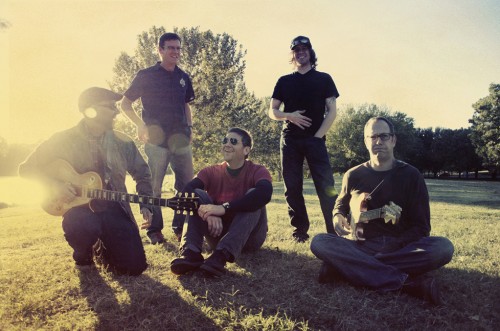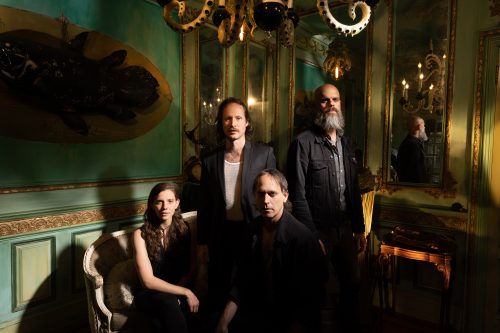By Michael Lester
To listen to moe. guitarist Chuck Garvey tell it, rock stars are no different than their fans when it comes to exploring the aesthetics and quirks of concert venues.
Garvey treats each concert experience like an archeological dig, even when he’s gearing up for a relatively small room like the Sherman Theater in Stroudsburg, Pa.
Garvey and his bandmates also like to explore the towns where they’re playing, while scouting the finest restaurants —preferably Thai — and music stores — if they actually exist there.
Discussing the Sherman, Garvey marveled at the immense movie projector anchored in the basement bowels of the venue, the onetime music house with a concert capacity of more than 1,000, up to 1,800 on a good night.
“I’m 6-foot-3, and it’s a big honking machine,” Garvey remarked. “It looks like the engine for a tractor.
“I like theaters like that. I enjoy playing shows at places like that. The stage. The sound. Every place has its own personality in that way. I really enjoy that. I like getting to the place and checking out the backstage. Seeing who’s played there. Seeing the old stuff. It’s like an archeology mission.”
When the rock quintet returns to the Sherman Sunday night for its fourth show there since 2008, “we (Garvey and fellow moe. guitarist Al Schnier) may have some kind of plan brewing to go up to the Martin guitar factory (about 25 miles away in Nazareth),” Garvey added. “I’m kind of looking forward to it.”
Both guitar junkies, Garvey and Schnier appreciate the history of their beloved string instrument and collect guitars as a hobby. Schnier says he owns between 50 and 60 himself.
Feeding addictive hobbies with field trips like these while on tour may not have been as practical for moe.’s five members had the band faced heavier media and music-writing demands of more mainstream bands playing to larger audiences at stadiums and arenas.
Playing smaller halls like the Sherman while occasionally opening for mega acts like Dave Matthews Band at larger venues such as Toyota Pavilion at Montage Mountain suits Schnier and Garvey just fine, thank you. Both sounded at peace with where 23 years of moe. have brought them since their days of playing basement parties on the campus of SUNY-Buffalo in the early 1990s.
That is to say a thriving rock band that has built one of the most loyal fan bases— affectionately called moe.rons — on today’s jam band scene. It’s a strong enough following to host their own annual multiband festivals — moe.down and snoe.down — and to begin work this fall on their 11th studio album.
“It’s a very gradual process,” explained Garvey, 44. “We’re no one-hit wonder band. But we’re not achieving pop stardom in any way. But people come back and see us a lot. There’s a big community spirit about it. We’re lucky to have fans who are like that. It would be awesome if it exploded. But that seems like a big hassle, too. It’s big business and a lot of planning.
“It seems like those people who achieve that level of stardom … I think they’re really fortunate,” Garvey added. “They can manage to have a somewhat normal life as well. I guess you have to be really driven to achieve that. And, once you get it, really like it and soak it up. I’m not sure that’s for everyone.
“I love our career. I love the fact that we have what we have. I think we’re fortunate. I’ve got this great job. I get to play music with my friends. I can think of a lot of things I would not want to be doing. We’re not in this slash-and-burn mentality, where we need to conquer the world, necessarily. We have always tried to be true to ourselves and our fans.”
An intimate setting seems to fit this tight-knit band’s roots. Garvey and Schnier attended the same high school in upstate New York. Schnier was one year ahead of Garvey. They knew each other well enough to say hi. Garvey met bassist Rob Derhak in college at SUNY-Buffalo and discovered “I could ride my bike between the house I grew up in and the house Rob grew up in.”
Schnier added some perspective to where moe. started and what it’s achieved.
“I heard a story recently on NPR saying the average tenure for a job is 5.43 years,” Schnier said. “I’ve been in moe. for 23 years now. That’s pretty good for a national average.”
Perhaps that’s because the band keeps things fresh. moe. is constantly inventing new ways to make their shows interesting and more intimate for their rabid fanbase. To commemorate their 20th anniversary in 2010, band members dressed in suits and ties throughout the tour.
“It was sort of dorky and weird,” Schnier joked. “Somehow, it felt like it elevated our job. It made the job more important because we were putting suits on to go to work. There was something nice about it. When you go to see Del McCoury’s band, and they’re so well-dressed . . . I remember talking to Del about it. It’s not just the aesthetics, it’s the worth ethic behind it. There were times when it was tedious — 100-degree days when you wore the suits.”
Then, there was the “Raise a Glass” promotion back in 2008 when moe. was marketing its then-latest album, “Sticks and Stones.” The band would start each night’s encore during that tour, including its March 6, 2008, performance at the Sherman, with “Raise a Glass.”
They would welcome to the stage well over a dozen contest winners from the audience for a free-for-all singalong that inevitably would deteriorate into a comedy routine, usually courtesy of band clown and beloved slap-bassist Derhak.
The moe. tradition that continues to this day is Schnier’s end-of-show birthday greetings and show milestone messages — “It’s (insert name)’s umpteenth moe. show tonight” — to begin each encore.
Schnier said most of what he reads during the encores are handwritten notes left on stage from fans throughout shows.
“That started … Gosh, it must have been 15 years ago,” Schnier said. “Fans would be able to attest to it better than me. My wife (Diane) surprised me and took me to see ‘Prairie Home Companion’ in the city. Garrison Keillor always announced these things during the show. The way they did it was you would have to go out in the lobby and write it on a piece of paper. They would collect them, and he would read them on stage.
“I thought, ‘What a great thing. We should steal that idea.’ And we did. It was early in our careers. We were still playing bars. It turned into this whole thing. The basket was on the edge of the stage. Anytime, people can drop (messages) off. Now, people just toss it at my feet. It maybe takes two minutes out of the night.”
This Sunday’s Sherman crowd may be in for moe. surprises like the “Gimme Shelter” (Rolling Stones) and “Don’t Fear the Reaper” (Blue Oyster Cult) covers the band busted out at Sherman shows past.
The last time moe. played the Sherman, back in 2012, Schnier had some time to kill before that March afternoon’s soundcheck.
“I ended up skiing at Camelback,” recalled Schnier, an avid skier, who religiously loads his skis aboard the band’s tour bus during winter concert season. “I thought, man, there’s a ski area here, and I don’t have to be at soundcheck for four or five hours. The owner of the venue gave me a ride and dropped me off.”
“Stroudsburg is a great venue,” Schnier continued. “It’s one of those places where the staff there is great. The people have always been very accommodating and super nice to us. It feels as lot like upstate New York. A very low-key, very casual atmosphere. There are not a ton of venues like that in the country.”




Leave a Reply